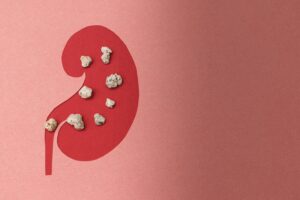
What Are Kidney Stones?
Kidney stones are solid objects that develop in your kidneys over time. They can vary in size, number, shape, and appearance. Kidney stones are composed of several crystal-forming substances. As materials like calcium oxalate accumulate in your kidney, they can create progressively larger masses.
Kidney Stone Complications
After forming, kidney stones eventually exit your body through your urinary tract. Some are only as big as a grain of sand and leave without you noticing. Others, however, reach golf-ball size—and can be painful to pass.
In some cases, a kidney stone might not make it out. When they become trapped in the ureter, the passage that transports urine from your kidney to your bladder, they can cause other symptoms. You may experience bleeding or problems passing urine, which might necessitate surgical removal of the stone.
Kidney Stone Causes
Various factors may raise your risk of developing kidney stones, including:
- Being a white male in your 30s or 40s
- Drinking insufficient liquid
- Eating a diet rich in nutrients that might crystallize, such as the phosphates in meat, fish, and other high-protein foods
- Eating a high-sodium diet, high-sugar diet, or diet with lots of animal-based proteins
- Having a urinary tract blockage
- Having a history of family members also developing urinary stones
- Having diabetes, chronic diarrhea, parathyroid disease, cystic fibrosis, gout, osteoporosis, high blood pressure, inflammatory bowel disease, or hypercalciuria (high urine calcium levels)
- Undergoing weight loss or intestine surgeries
- Taking certain medications
Anyone can develop kidney stones. You may also have this condition for some time without noticing since pain usually doesn’t arise until the stone exits your kidney.
Understand Your Kidney Stone Treatment Options
Kidney stones can cause serious symptoms that lower your everyday quality of life. Don’t wait to seek game-changing treatment if you suspect you might have this problem. Reach out to the Greater Hartford Urology Group in Hartford, CT, or Farmington, CT, by scheduling your appointment on the web or calling 860-522-2251.


